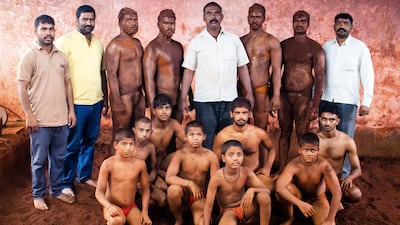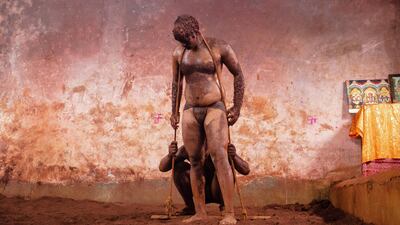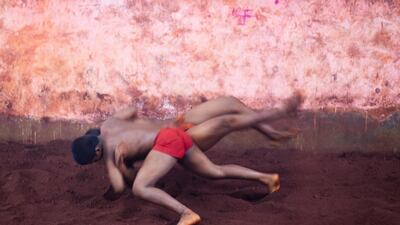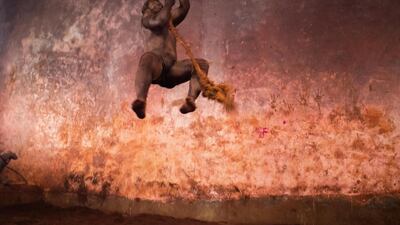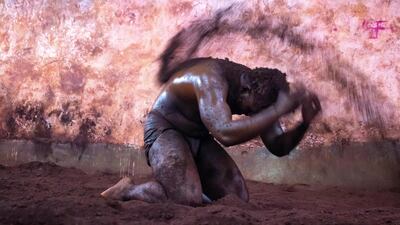Wrestler Sachin Salunkhe has not grappled in six months. But not because of a shoulder dislocation, ligament tear, or a fracture, it is the splintered rural economy that makes him work 16 hours a day to feed his family.
Salunkhe, 26, who is from Pargaon village in Kolhapur district of western India’s Maharashtra state, has been a wrestler for 13 years and won numerous accolades. His career, like those of thousands of other rural wrestlers, is now on hold because of the coronavirus pandemic.
The Indian government declared a 21-day lockdown on March 24, restricting the movement of 1.3 billion people and curbing all economic activities. The lockdown was later extended by 10 weeks, crippling Salunkhe's wrestling career.
Salunkhe, who also works as a security guard at a private university, had to find more work to support his family of five.
For half the rate of his usual employment, he took on agricultural work for eight hours a day, bringing in 150 rupees ($2) or less.
The last time he fought was on February 21 in the nearby village of Kini in Kolhapur district, where he won about $25 after wrestling for 25 minutes.
After nearly a year of the coronavirus pandemic, this temporary bandage to his income is looking more permanent.
Salunkhe cannot afford the time to train and the cash to feed himself the 3,500 to 3,700 calories needed each day to train efficiently. He barely makes 450 rupees a day despite working two jobs.
"Every day, a wrestler has to spend at least 500 rupees on food," he told The National.
His coach, Maruti Mane, 50, said: “We can’t train them as required. They aren’t fit now, nor is their stamina enough to wrestle.”
Wrestling in red clay pits was popularised in Kolhapur by the ruler Shahu Maharaj. During the late 1800s, several wrestling schools known as taleems (Urdu for education) were built in Kolhapur that are functional even today.
Villages in western Maharashtra hold a jatra (annual fair) where kushti (wrestling) held in the open air remains the centre of attraction. Wrestlers from Afghanistan, Pakistan, Iran and a few African countries are in great demand.
It takes a poor crop or a natural disaster to disrupt the wrestling events that start in August and last for 10 months. The prize money in these bouts can range from $25 to $7,000, depending on the wrestlers and the amount pledged by farmers and local people.
"A normal wrestler can earn as much as $680 in a season, and it can go as high as $27,225 for the elite wrestlers," Mr Mane told The National. This money supports them and funds their training for the next season.
Covid-19 and the measures taken to combat its spread caused the Hanuman taleem in Pargaon village to shut for more than six months, for the first time in more than a century.
“Normally during this time, the taleem walls are filled with posters of wrestling events from across Maharashtra,” Mr Mane said.
Mr Mane, who has trained more than 1,000 wrestlers in 25 years, has never seen a disaster like this. “Only the ones who are privileged can survive.”
Salunkhe’s situation bears this out: even if he practises for just four hours each day, that leaves only four hours for eating, sleep, travel and other chores.
Meanwhile, the top wrestlers can devote as much as eight to 10 hours a day to training without worrying about the costs, which can go as high as $275 a month.
Salunkhe now faces tremendous pressure from his family to quit the sport. “I love wrestling, and that’s why I practise,” he said.
Mayur Bagde, 20, is a fellow wrestler from the same village who also works as a fisherman and agricultural labourer. With no means of getting to fish markets in the lockdown, he had to completely abandon his training diet.
“Even if we train, it’s not helping much,” said Bagde, who estimates he has lost a year’s income because of the pandemic.
“A normal wrestler can at least contest 60 matches of 30 minutes each in a season,” Mr Mane said.
“Even if you lose the match, the organisers give 25 per cent. There [in cities], they bid a farewell saying good luck for the next match.” Mr Mane, who does not charge for coaching, now fears the sport will go into decline as rural wrestlers quit the sport.
Mr Mane has worked as a watchman at a local hospital for the past three decades.
“I haven’t been paid my salary for the past six months,” he said.
It is Mr Mane's passion that has kept wrestling alive in his village.
“Every day, he ensures everyone trains and even visits their house if wrestlers aren’t keeping well,” said Amol Sawant, a retired state-level wrestler.
There are 40 wrestlers from the ages of 10 to 30 training under Mr Mane, of whom 12 stay in the taleem. Usually, industrialists and enthusiasts cover their expenses, while a few sugar factories pay a monthly stipend of about $14. After successive triumphs, Mr Mane’s son Shankar, 20, was promised a stipend from a renowned sugar factory. “I haven’t received any stipend for a year,” he said.
Mr Mane is not surprised. “Who pays attention to the wrestlers training in rural taleems,” he said, capturing the grim reality for a sport with a history of more than 300 years.

